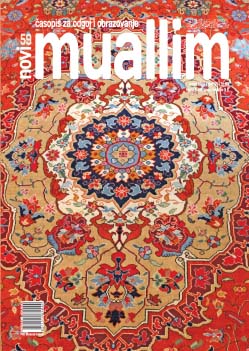Primjena novih oblika i metoda: interaktivnog učenja u nastavi srednjoškolske islamske vjeronauke
IMPLEMENTATION OF NEW FORMS AND METHODS: INTERACTIVE LEARNING IN THE CLASS OF ISLAMIC RELIGIOUS STUDIES IN HIGH-SCHOOLS
Author(s): Hikmet HekićSubject(s): Social Sciences, Education, Theology and Religion, Islam studies, School education, Vocational Education
Published by: Rijaset Islamske zajednice u Bosni i Hercegovini
Keywords: interactive learning; Islamic religious studies in high-schools; attitudes; teachers of the Islamic religious studies in high-schools
Summary/Abstract: The aim of this research was to establish and analyze attitude of teachers of the Islamic religious studies towards the implementation of interactive learning in the class of Islamic religious studies in high-schools, as well as their viewpoint about the efficiency of the implementation of new forms and methods as compared to traditional. This research was carried out through: analysis of the opinion of teachers about the current degree of implementation of interactive learning in the class of Islamic religious studies in high-schools and about the efficiency of the implementation of new forms and methods as compared to traditional; analysis of the attitude of teachers towards motivation and material and technical conditions in the schools that are required for the implementation of new forms and methods in the class of high-school Islamic religious studies; analysis of the attitude of teachers towards interactive learning and the need for forming the centers for teachers training for the implementation of new forms and methods of teaching the class. The research indicated following: in general view, the teachers consider that current implementation of interactive learning in the class of Islamic religious studies in high-schools is either non-existent or insufficient, whereas a great majority of teachers are of the opinion that new forms and methods are either absolutely or much more efficient in relation to traditional forms and methods; as for motivation, research results show that majority of teachers are highly or sufficiently motivated to implement new forms and methods in the class of Islamic religious studies, and more than a half of the number of interviewed teachers consider that the schools have none or very little material and technical equipment required for the implementation of new forms and methods in the class of Islamic religious studies; teachers attitude towards interactive learning, research results indicate that majority of teachers considers interactive learning beneficial for each student and teacher, likewise a great majority of teachers are of the opinion that it is necessary to form centers for teachers training for the implementation of new forms and methods of teaching the class. And finally, on the bases of the research results we presented the implications of the analysis.
Journal: Novi Muallim
- Issue Year: 2014
- Issue No: 59
- Page Range: 60-66
- Page Count: 7
- Language: Bosnian

